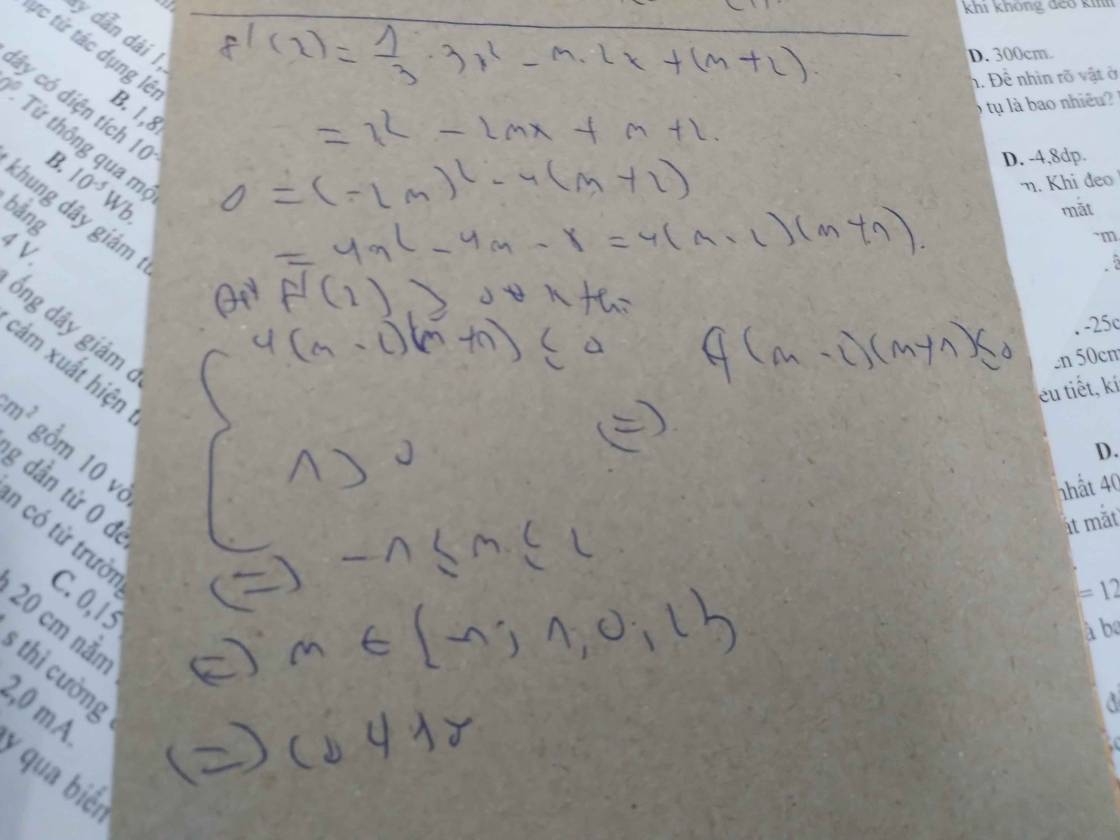Hãy nhập câu hỏi của bạn vào đây, nếu là tài khoản VIP, bạn sẽ được ưu tiên trả lời.

a: \(y=-\dfrac{1}{3}x^3-mx^2+4x+2021m\)
=>\(y'=-\dfrac{1}{3}\cdot3x^2-m\cdot2x+4\)
=>\(y'=-x^2-2m\cdot x+4\)
Để hàm số nghịch biến trên R thì \(y'< =0\forall x\)
=>\(\left\{{}\begin{matrix}\text{Δ}< =0\\a< 0\end{matrix}\right.\Leftrightarrow\left\{{}\begin{matrix}\left(-2m\right)^2-4\cdot\left(-1\right)\cdot4< =0\\-1< 0\end{matrix}\right.\)
=>\(4m^2+16< =0\)
mà \(4m^2+16>=16>0\forall m\)
nên \(m\in\varnothing\)
b: \(y=-\dfrac{1}{3}\cdot x^3-\dfrac{1}{2}\cdot m\cdot x^2+x+20\)
=>\(y'=-\dfrac{1}{3}\cdot3x^2-\dfrac{1}{2}\cdot m\cdot2x+1\)
=>\(y'=-x^2-m\cdot x+1\)
Để hàm số nghịch biến trên R thì \(y'< =0\forall x\)
=>\(\left\{{}\begin{matrix}\text{Δ}< =0\\a< 0\end{matrix}\right.\Leftrightarrow\left\{{}\begin{matrix}\left(-m\right)^2-4\cdot\left(-1\right)\cdot1< =0\\-1< 0\end{matrix}\right.\)
=>\(m^2+4< =0\)
mà \(m^2+4>=4>0\forall m\)
nên \(m\in\varnothing\)

\(y'=x^2-2x+m\)
\(y'\ge0\) ; \(\forall x\in\left(1;3\right)\Leftrightarrow x^2-2x+m\ge0\) ;\(\forall x\in\left(1;3\right)\)
\(\Leftrightarrow m\ge\max\limits_{\left(1;3\right)}\left(-x^2+2x\right)\)
Xét hàm \(f\left(x\right)=-x^2+2x\) trên \(\left(1;3\right)\)
\(-\dfrac{b}{2a}=1\) ; \(f\left(1\right)=1\) ; \(f\left(3\right)=-3\)
\(\Rightarrow m\ge1\)

Toi mới làm được câu 2 thoi à :( Mấy câu còn lại để rảnh nghĩ thử coi sao
\(PTHDGD:\dfrac{x+1}{x-1}=2x+m\Leftrightarrow x+1=\left(2x+m\right)\left(x-1\right)\)
\(\Leftrightarrow x+1=2x^2-2x+mx-m\Leftrightarrow2x^2+\left(m-3\right)x-m-1=0\)
De ton tai 2 diem phan biet \(\Leftrightarrow\Delta>0\Leftrightarrow\left(m-3\right)^2+8m+8>0\Leftrightarrow m^2+2m+17>0\Leftrightarrow\left(m+1\right)^2+16>0\forall x\)
\(\Rightarrow\left\{{}\begin{matrix}x_1+x_2=\dfrac{3-m}{2}\\x_1x_2=\dfrac{-m-1}{2}\end{matrix}\right.\)
Vi 2 tiep tuyen tai 2 diem x1, x2 song song voi nhau
\(\Rightarrow f'\left(x_1\right)=f'\left(x_2\right)\)
\(f'\left(x\right)=\dfrac{x-1-x-1}{\left(x-1\right)^2}=-\dfrac{2}{\left(x-1\right)^2}\)
\(\Rightarrow\dfrac{1}{\left(x_1-1\right)^2}=\dfrac{1}{\left(x_2-1\right)^2}\Leftrightarrow x_1^2-2x_1+1=x_2^2-2x_2+1\)
\(\Leftrightarrow\left(x_1-x_2\right)\left(x_1+x_2\right)-2\left(x_1-x_2\right)=0\Leftrightarrow\left(x_1-x_2\right)\left(x_1+x_2-2\right)=0\)
\(\Leftrightarrow\left[{}\begin{matrix}x_1=x_2\left(loai\right)\\x_1+x_2=2\end{matrix}\right.\Leftrightarrow\dfrac{3-m}{2}=2\Leftrightarrow m=-1\)

3.
Hàm trùng phương \(f\left(x\right)=ax^4+bx^2+c\) với \(a\ne0\) đồng biến trên \(\left(0;+\infty\right)\) khi và chỉ khi:
\(\left\{{}\begin{matrix}a>0\\b\ge0\end{matrix}\right.\) \(\Leftrightarrow m\ge0\)
Hoặc giải bt: \(y'=4x^3+2mx\ge0\) ;\(\forall x>0\)
\(\Leftrightarrow2x\left(x^2+m\right)\ge0\)
\(\Leftrightarrow x^2+m\ge0\)
\(\Leftrightarrow x^2\ge-m\)
\(\Leftrightarrow-m\le min\left(x^2\right)=0\Rightarrow m\ge0\)
1.
Giả sử tiếp tuyến d có 1 vtpt là \(\left(a;b\right)\) với \(a^2+b^2>0\)
\(\Rightarrow cos30^0=\frac{\sqrt{3}}{2}=\frac{\left|a-2b\right|}{\sqrt{\left(a^2+b^2\right)\left(1^2+\left(-2\right)^2\right)}}=\frac{\left|a-2b\right|}{\sqrt{5\left(a^2+b^2\right)}}\)
\(\Leftrightarrow4\left(a-2b\right)^2=15\left(a^2+b^2\right)\)
\(\Leftrightarrow11a^2+16ab-b^2=0\)
Nghiệm xấu quá nhìn muốn nản, bạn tự làm tiếp :)
2.
\(y'=cosx-2sinx+2m-5\)
Hàm số đồng biến trên TXĐ khi và chỉ khi \(y'\ge0\) ; \(\forall x\)
\(\Leftrightarrow cosx-2sinx+2m-5\ge0\) ;\(\forall x\)
\(\Leftrightarrow2m-5\ge2sinx-cosx\)
\(\Leftrightarrow2m-5\ge f\left(x\right)_{max}\) với \(f\left(x\right)=2sinx-cosx\)
Ta có: \(f\left(x\right)=2sinx-cosx=\sqrt{5}\left(\frac{2}{\sqrt{5}}sinx-\frac{1}{\sqrt{5}}cosx\right)=\sqrt{5}sin\left(x-a\right)\)
Với \(a\in\left(0;\pi\right)\) sao cho \(cosa=\frac{2}{\sqrt{5}}\)
\(\Rightarrow f\left(x\right)\le\sqrt{5}\Rightarrow2m-5\ge\sqrt{5}\Rightarrow m\ge\frac{5+\sqrt{5}}{2}\)

1: \(f'\left(x\right)=\dfrac{1}{3}\cdot3x^2+2x-\left(m+1\right)=x^2+2x-m-1\)
\(\Delta=2^2-4\left(-m-1\right)=4m+8\)
Để f'(x)>=0 với mọi x thì 4m+8<=0 và 1>0
=>m<=-2
=>\(m\in\left\{-10;-9;...;-2\right\}\)
=>Có 9 số

Lời giải:
\(y'=\frac{2}{3}x+m\geq 0, \forall x\in\mathbb{R}\Leftrightarrow m\geq -\frac{2}{3}x, \forall x\in\mathbb{R}\)
\(\Leftrightarrow m\geq \max (\frac{-2}{3}x), \forall x\in\mathbb{R}\)
Vì $\frac{-2}{3}x$ không có max với mọi $x\in\mathbb{R}$ nên không tồn tại $m$